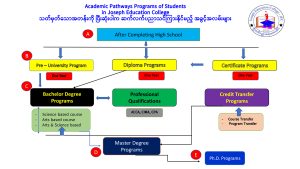Our BEng (Hons) Computer Science degree is designed to offer you a wide choice of career options when you graduate as the final year enables you to specialise in subjects of your choice, such as AI, ethical hacking or computer networks.
As a student at JEC, you’ll learn how to work in a team, think independently, and solve problems creatively in our computing labs.
Our course is hands-on, and assessment is based less on traditional exams and tests (about 30%) and more on coursework assignments, reports and presentations.
Here is your Academic Pathway:

-
DEGREE CONFERRED
- Bachelor of Engineering (Hons) Computer Science
-
School Fees
- Enrolment Fees is US$ 100 (non-refundable)
- School fees is US$ 15,000 for (4) years.
| Payment Plan | US Dollar Currency |
| First Year | 6000 |
| Second Year | 4000 |
| Third Year | 3000 |
| Final Year | 2000 |
-
GRADUATION REQUIREMENTS
Joseph Education College (JEC) confers the degree of Bachelor of Hospitality and Tourism Management upon students who meet all of the following requirements:
- Have completed the total number of credits of the curriculum
- Have obtained a cumulative grade point average of at least 2.00
- Have participated in 16 sessions of the Professional Ethics Seminar
- Have obtained library and financial clearance from the university
- Have demonstrated good behavior and discipline
- Have to meet the minimum English Proficiency requirement specified in one of the following criteria
| Test Instruments | Required Passing Scores |
|---|---|
| JEC English Proficiency Assessment or |
70%* |
| TOEFL (iBT) or |
90 |
| TOEFL (P) or |
575 |
| IELTS | 6.5 |
*70% = Level B2 in Common European Framework of Reference for Language (CEFR)
In your final year, optional modules let you focus on areas you’re interested in such as artificial intelligence, network security, and cloud computing.
Modules are subject to change and availability, and may vary by location. If you have the choice of optional modules, these are indicated with a *.
Foundation in Engineering, Computing and Technology
In your first year you’ll study foundation program. This module will provide you with the necessary skills to begin studying at level 4 in engineering, computer science and related courses. You will be introduced to the core skills necessary to succeed in higher education, including thinking critically, researching and referencing appropriately, demonstrating appropriate numeracy and ICT skills, and communicating effectively verbally and in writing. In addition to these fundamental skills, you’ll cover the subjects underpinning the technological disciplines. Fundamental mathematical skills will be covered, alongside pre-calculus, followed by an introduction to calculus and vector and matrix arithmetic. You will also be introduced to classical mechanics, and its application to real-world scenarios. You will be introduced to the fundamentals of computer science, learning about the principles behind programming and applying them through a series of practical coding exercises. You’ll undertake a multi-disciplinary group project as you learn about the collaborative nature of engineering, and design from a broader perspective of business. The module is made up of the following eight constituent elements: Interactive Learning Skills and Communication (ILSC); Information Communication Technology (ICT); Critical Thinking; Maths for Scientists; Maths for Engineers; Physics for Engineers; Fundamentals of Computing; Engineering Design.
- Computer Systems (30 credits)
- Software Principles (15 credits)
- Introduction to Programming (30 credits)
- Core Mathematics for Computing (15 credits)
- Operating Systems (30 credits)
- Into ARU
- Computing Research Methodologies (15 credits)
- Database Design and Implementation (15 credits)
- Digital Security (15 credits)
- Algorithm Analysis and Data Structures (15 credits)
- Network Routing (15 credits)
- Software Engineering (30 credits)
- Ruskin Module (15 credits)
- Final Project (30 credits)
- Image Processing (15 credits)
- Professional Issues: Computing and Society (15 credits)
- Cloud Computing (15 credits)
- Artificial Intelligence (15 credits) *
- Ethical Hacking and Countermeasures (15 credits) *
- Digital and Network Security Forensics (15 credits) *
- Advanced Network Solutions (15 credits) *
- Embedded Computing (15 credits) *
- Computer Graphics Programming (15 credits) *
